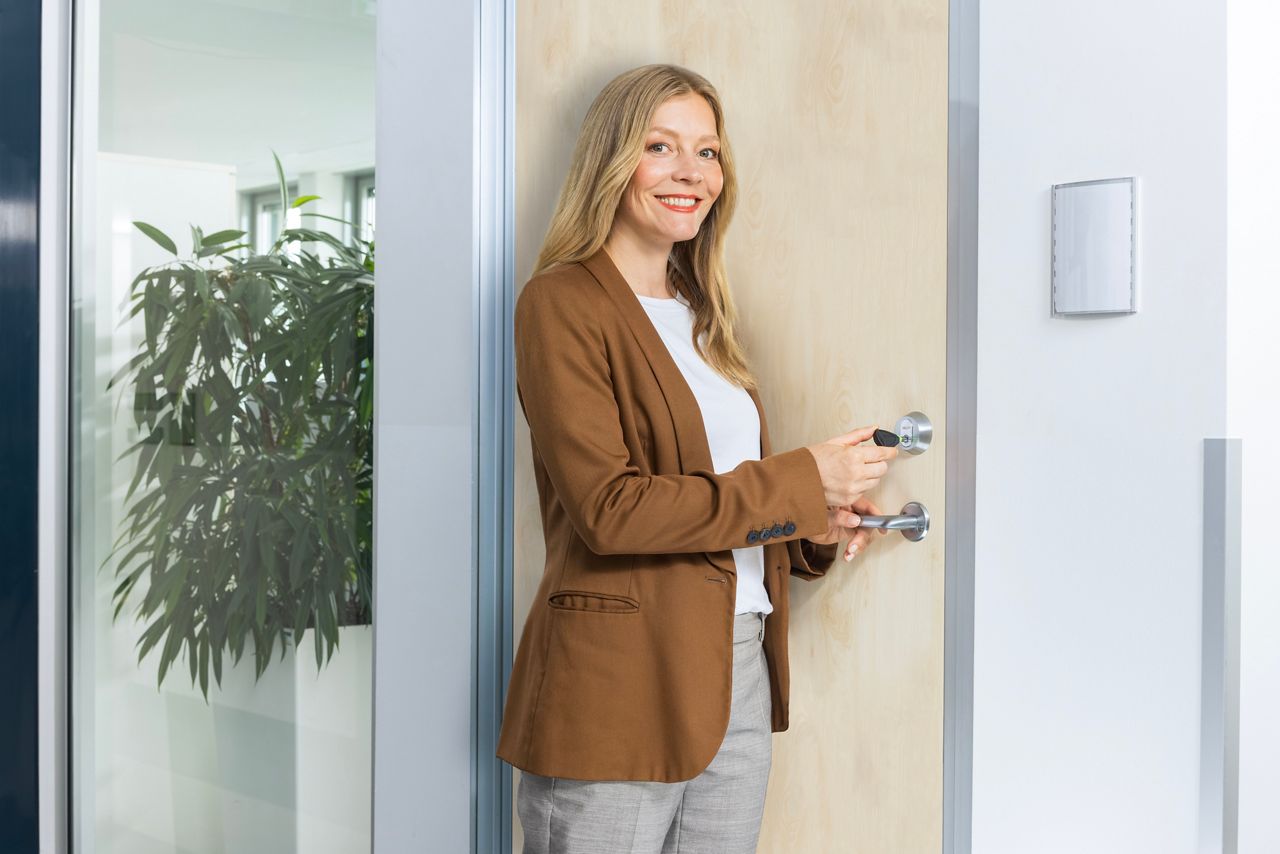How sustainability inspires innovation and product design


Olympia Dolla, Head of Sustainability Program EMEIA at ASSA ABLOY Opening Solutions EMEIA, shares how she and her team are embedding sustainability at the core of a global industry leader and why this approach is essential to fostering a customer centric culture.
With a background as an environmental scientist, and with a Master’s in Sustainable Development, Energy, and Materials, Olympia has long been passionate about renewable energy, product life cycle analysis and circular economy. Her journey began in Greece, where she completed her initial degree, before pursuing her Master’s in the Netherlands.
An internship at TU Delft ignited her desire to collaborate with businesses to drive impactful, sustainable innovation. This passion has guided her through roles in the chemical and construction industries, as well as sustainable R&D and policy roles. Eventually, it led her to ASSA ABLOY Opening Solutions EMEIA, where she has been instrumental in advancing the company’s sustainability agenda since joining in 2022. Throughout her career, Olympia has also maintained a presence within many influential organisations, including ECO Platform, Construction Product Europe, and the World Green Building Council.
Olympia and her wider team have played a key role in driving EMEIA Science Based Targets (SBTs) pathway towards net zero emissions by 2050. She has led a comprehensive Scope 3 strategy, aligning sustainability efforts across various parts of the organisation, including procurement, operations, innovation, and product design.
The importance of sustainability is redefining how companies operate, from supply chains to product designs. At ASSA ABLOY Opening Solutions EMEIA, sustainability is not a box-ticking exercise; it is embedded as a core principle within the business. This mindset is transforming the company’s approach to innovation, highlighting the strong connection between sustainability and innovation with the primary objective to deliver products and solutions that meet the evolving needs of customers.
Sustainability as a catalyst for innovation
Sustainability challenges businesses to rethink conventional practices and develop innovative ways to reduce environmental impact. For ASSA ABLOY Opening Solutions EMEIA, this includes using recycled materials in our products, designing for durability, and ensuring that our products can be reused or recycled at the end of their lifecycle. These efforts not only reduce waste and minimise the overall carbon footprint of our operations, but they drive innovative thinking. From discovering new materials to finding creative ways to reuse products and enhancing product quality, sustainability inspires continuous improvement. Throughout this journey, we remain focused on meeting our customers' evolving needs, delivering solutions that align with their priorities and the planet’s future.
A key priority at ASSA ABLOY Opening Solutions EMEIA is empowering our engineering and design teams to incorporate carbon footprint considerations into product development. By integrating circularity principles and designing products for easy disassembly and reuse, we are actively shaping the future of sustainable innovation and minimising waste.
We are also focused on reducing the carbon footprint of our products. Since 2024, all new products developed within EMEIA must achieve at least a 20% reduction in CO2 emissions compared to their predecessors. This ambitious goal is being achieved through the use of sustainable materials and innovative design practices, demonstrating our commitment to creating products that not only meet today’s needs but also support a sustainable future.
Sustainable products for the future
Buildings account for approximately 30% of global energy consumption, according to the International Energy Agency (IEA). By addressing energy use at every stage of a building’s lifecycle, we have the opportunity to make a significant and immediate impact on global energy efficiency.
At ASSA ABLOY Opening Solutions EMEIA, energy efficiency drives the development, design, and manufacturing of our innovative solutions. From energy-harvesting technology to mobile keys and energy-efficient devices, our products enhance sustainability performance from the outset while equipping building owners with the flexibility to adapt to future challenges.
Looking ahead, we are pushing the boundaries of innovation by further exploring advanced technologies such as energy harvesting, which captures energy generated through everyday actions. By integrating these capabilities into our Digital & Access Solutions (DAS) product range, we are demonstrating how sustainability can inspire groundbreaking advancements in access control.

Regulation as a springboard for innovation
The drive for sustainability extends beyond individual organisations. It requires industry-wide collaboration and a collective push toward higher standards. Compliance with mandatory regulations should not be viewed as an encumbrance but as a springboard for innovation and encourage companies to work smarter and faster. For example, through collaboration with key stakeholders on large-scale projects, we ensure that sustainability isn’t just a regulatory requirement but a value-add.
Environmental Product Declarations (EPDs) are crucial for construction and related industries, as they provide transparent, standardised, and measurable information about a products environmental impact across its lifecycle. This drives more informed decision making and as they are aligned with frameworks such as LEED, BREEAM, and other green certification programs, they help to support sustainable building and construction practices.
By the end of 2024, we had 24 active EPDs published within EMEIA, with more set to follow in 2025. This is just the beginning of our commitment to driving greater transparency and sustainability in the industry.
Sustainability at the heart of our operations
Our commitment to sustainability extends beyond our products and encompass every aspect of our operations. Across our operations, we prioritise energy optimisation by implementing solutions such as photovoltaic (PV) panels and lean manufacturing practices. A shining example of this commitment is our Rychnov factory, which has achieved remarkable advancements in energy efficiency.
The Rychnov facility, covering more than 17,000 square meters, requires substantial energy to support its heavy machinery, galvanic lines, and the operational needs of its office buildings and warehouses. To address this, we have integrated a series of digitisation initiatives as part of our ‘smart factory’ program, which supports our Science Based Targets.
One key project at Rychnov was the implementation of an advanced energy monitoring system. This innovative tool tracks energy usage and identifies areas for improvement. The process involved installing sensors and devices to measure key variables such as temperature, light intensity, and the consumption of electricity, gas, compressed air, and water. This data provided precise insights into the energy demands of each machine, process, and assembly line, enabling us to make data-driven decisions and optimise operations.
The results have been transformative. Autonomous systems now adjust lighting intensity based on natural light, while heating and ventilation systems activate only when specific temperature thresholds are met. By aligning compressed air production with actual demand, we have increased production efficiency by an impressive 10.6%.
These advancements underscore the power of data-driven strategies in reducing energy consumption, minimising waste, and integrating sustainability into our operations.
Beyond compliance: A vision for the future
At ASSA ABLOY Opening Solutions EMEIA, we believe that sustainability is about more than meeting regulations—it’s about setting new benchmarks for the industry. By aligning our innovation strategies with sustainable practices, we are not only reducing our environmental footprint but also inspiring broader changes across the sector.
The journey to a sustainable future is one of collaboration, ingenuity, and determination. By embracing sustainability as a driver of innovation, companies can create products and solutions that not only meet the needs of today but also safeguard the resources of tomorrow.

